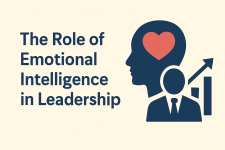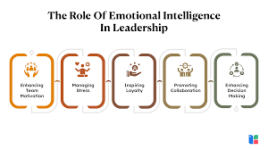The Role of Emotional Intelligence in Leadership
In today’s fast-paced and constantly evolving business landscape, technical skills alone are no longer sufficient to make a great leader. While intelligence, experience, and strategic thinking are undeniably important, the true differentiator often lies in something more human—emotional intelligence (EQ). Leaders with high emotional intelligence are not only better at managing their own emotions but also excel at understanding and influencing the emotions of those around them. This makes EQ one of the most crucial skills in modern leadership.
What is Emotional Intelligence?
Emotional intelligence is the ability to recognize, understand, manage, and influence emotions—both your own and others’. Psychologist Daniel Goleman popularized the concept and identified five key components:
1. Self-awareness – Recognizing your own emotions and how they affect your behavior.
2. Self-regulation – Managing your emotions in healthy ways, especially in stressful situations.
3. Motivation – Being driven to achieve for the sake of achievement.
4. Empathy – Understanding the emotions of others and treating them accordingly.
5. Social skills – Managing relationships to move people in desired directions.
Why EQ Matters in Leadership
Leaders set the tone for the entire team or organization. A leader with low EQ might struggle to handle conflicts, provide constructive feedback, or motivate their team. On the other hand, a leader with high EQ can foster a positive work culture, build trust, and make more balanced decisions.
For example, during a crisis or under pressure, emotionally intelligent leaders remain calm, reassure their team, and approach problems logically instead of reacting impulsively. This sense of composure can significantly influence team morale and performance.
Benefits of Emotionally Intelligent Leadership
1. Improved Team Collaboration: EQ allows leaders to navigate interpersonal dynamics and bring out the best in their teams.
2. Better Decision Making: Understanding emotional undercurrents helps leaders make more thoughtful, people-centered decisions.
3. Conflict Resolution: Leaders with EQ can identify tension points early and resolve conflicts in ways that benefit everyone.
4. Higher Employee Retention: Teams are more loyal and engaged when they feel heard, understood, and supported.
Can Emotional Intelligence Be Developed?
Yes, emotional intelligence is not fixed. It can be developed through self-reflection, mindfulness, active listening, and empathy-building exercises. Great leaders are often those who are willing to grow not just professionally, but personally as well.
Conclusion
While leadership has traditionally been associated with authority and control, the modern workplace values empathy, understanding, and emotional agility. Emotional intelligence is no longer a “nice to have”—it’s a must-have for leaders who want to inspire, motivate, and build lasting impact. By nurturing EQ, we pave the way not only for better leadership but also for a more compassionate and productive work environment.
In today’s fast-paced and constantly evolving business landscape, technical skills alone are no longer sufficient to make a great leader. While intelligence, experience, and strategic thinking are undeniably important, the true differentiator often lies in something more human—emotional intelligence (EQ). Leaders with high emotional intelligence are not only better at managing their own emotions but also excel at understanding and influencing the emotions of those around them. This makes EQ one of the most crucial skills in modern leadership.
What is Emotional Intelligence?
Emotional intelligence is the ability to recognize, understand, manage, and influence emotions—both your own and others’. Psychologist Daniel Goleman popularized the concept and identified five key components:
1. Self-awareness – Recognizing your own emotions and how they affect your behavior.
2. Self-regulation – Managing your emotions in healthy ways, especially in stressful situations.
3. Motivation – Being driven to achieve for the sake of achievement.
4. Empathy – Understanding the emotions of others and treating them accordingly.
5. Social skills – Managing relationships to move people in desired directions.
Why EQ Matters in Leadership
Leaders set the tone for the entire team or organization. A leader with low EQ might struggle to handle conflicts, provide constructive feedback, or motivate their team. On the other hand, a leader with high EQ can foster a positive work culture, build trust, and make more balanced decisions.
For example, during a crisis or under pressure, emotionally intelligent leaders remain calm, reassure their team, and approach problems logically instead of reacting impulsively. This sense of composure can significantly influence team morale and performance.
Benefits of Emotionally Intelligent Leadership
1. Improved Team Collaboration: EQ allows leaders to navigate interpersonal dynamics and bring out the best in their teams.
2. Better Decision Making: Understanding emotional undercurrents helps leaders make more thoughtful, people-centered decisions.
3. Conflict Resolution: Leaders with EQ can identify tension points early and resolve conflicts in ways that benefit everyone.
4. Higher Employee Retention: Teams are more loyal and engaged when they feel heard, understood, and supported.
Can Emotional Intelligence Be Developed?
Yes, emotional intelligence is not fixed. It can be developed through self-reflection, mindfulness, active listening, and empathy-building exercises. Great leaders are often those who are willing to grow not just professionally, but personally as well.
Conclusion
While leadership has traditionally been associated with authority and control, the modern workplace values empathy, understanding, and emotional agility. Emotional intelligence is no longer a “nice to have”—it’s a must-have for leaders who want to inspire, motivate, and build lasting impact. By nurturing EQ, we pave the way not only for better leadership but also for a more compassionate and productive work environment.


